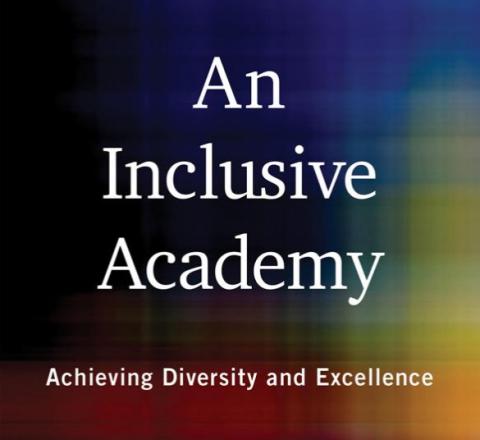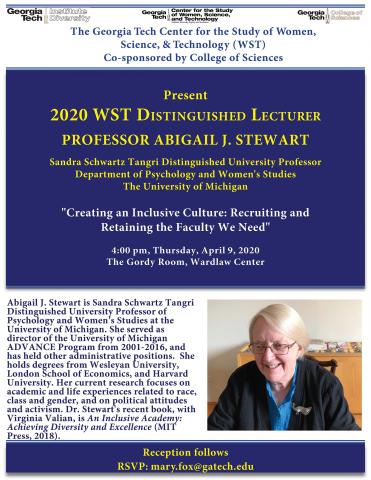event
(Postponed) 2020 WST Distinguished Lecture: Professor Abigail Stewart, "Creating an Inclusive Culture: Recruiting and Retaining the Faculty We Need"
Primary tabs
The 2020 WST Distinguished Lecture with Abigail Stewart, orginally scheduled for April 9, has been postponed. Please visit cos.gatech.edu for further updates.
RSVP: If you'd like to attend this free event, please email: mary.fox@gatech.edu
Please join the College of Sciences and the Center for the Study of Women, Science, and Technology for the 2020 WST Distinguished Lecture with Professor Abigail Stewart, who will speak on "Creating an Inclusive Culture: Recruiting and Retaining the Faculty We Need."
Everyone is welcome to attend and enjoy a reception following the lecture!
About Abigail J. Stewart
Dr. Abigail J. Stewart is the Sandra Schwartz Tangri Distinguished University Professor of Psychology and Women's Studies at the University of Michigan. She served as director of the University of Michigan ADVANCE Program, 2001-2016, before which she held a number of other administrative positions. She holds degrees from Wesleyan University, London School of Economics, and Harvard University. Her current research focuses on academic and life experiences related to race, class and gender, and on political attitudes and activision.
Dr. Stewart's recent book, with Virginia Valian, is called An Inclusive Academy: Achieving Diversity and Excellence (MIT Press, 2018):
How colleges and universities can live up to their ideals of diversity, and why inclusivity and excellence go hand in hand.
Most colleges and universities embrace the ideals of diversity and inclusion, but many fall short, especially in the hiring, retention, and advancement of faculty who would more fully represent our diverse world—in particular women and people of color. In this book, Abigail Stewart and Virginia Valian argue that diversity and excellence go hand in hand and provide guidance for achieving both.
Stewart and Valian, themselves senior academics, support their argument with comprehensive data from a range of disciplines. They show why merit is often overlooked; they offer statistics and examples of individual experiences of exclusion, such as being left out of crucial meetings; and they outline institutional practices that keep exclusion invisible, including reliance on proxies for excellence, such as prestige, that disadvantage outstanding candidates who are not members of the white male majority.
Perhaps most important, Stewart and Valian provide practical advice for overcoming obstacles to inclusion. This advice is based on their experiences at their own universities, their consultations with faculty and administrators at many other institutions, and data on institutional change. Stewart and Valian offer recommendations for changing structures and practices so that people become successful in ways that benefit everyone. They describe better ways of searching for job candidates; evaluating candidates for hiring, tenure, and promotion; helping faculty succeed; and broadening rewards and recognition.
Groups
Status
- Workflow status: Published
- Created by: jhunt7
- Created: 03/06/2020
- Modified By: jhunt7
- Modified: 03/16/2020
Categories
User Data
Target Audience


